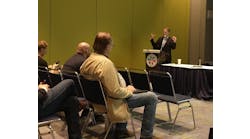Latest from Hydronics Systems
Sponsored
Designing hydronic systems at Little Red Schoolhouse
CHICAGO — Just recently, Candace Roulo, executive editor for CONTRACTOR, attended a Modern Hydronic Heating Systems Basic Seminar at Xylem’s Bell & Gossett Little Red Schoolhouse, located in Morton Grove, Ill.
The Little Red Schoolhouse offers many seminars — from a service and maintenance of water based HVAC systems seminar to a plumbing systems design seminar — for industry professionals, including plumbing, hydronic and HVACR contractors and engineers. The Modern Hydronic Heating Systems Basic Seminar is perfect for wholesalers, contractors or anyone with a desire to understand basic hydronic system design.
Learning objectives of the Modern Hydronic Heating seminar include having a working knowledge of the advantages of properly designed hydronic systems, how to size boilers, pumps, piping, compression tanks and hydronic specialties for hydronic systems, how to apply rules of thumb to design simple systems, and how to implement the Bell & Gossett System Syzer to complete typical calculations.
Larry Konopacz, senior manager of technical training at Xylem, and Stan Kutin, instructor at the Little Red Schoolhouse, presented the three-day seminar, which was a deep dive into the basics of different types of hydronic systems, including series loop, Monoflo, small radiant panel systems and a two-pipe, reverse return heating system.
According to Kutin, designing hydronic systems is an art and science of providing comfort via water as an intermediate heat transfer medium.
“You can create and design systems in different ways just as long as you stay within scientific boundaries,” said Kutin. “Comfort is why we design these systems.”
When it comes to selling a hydronic system, cost tends to be the biggest issue for customers.
“There are many fears about hydronic systems, cost being one of them, plus, there are concerns about pipes leaking, it can make a house too dry, radiators are often big and ugly,” said Konopacz.
However, according to Kutin, homeowners have said after the fact of purchasing a new home and living in it, they would have willingly paid more for a hydronic system when compared to the builder-selected comfort system if they were given the choice and if they had known about alternative systems.
There are many reasons to love hydronic systems, such as they provide superior thermal comfort, are quiet in operation, have room by room control, are a single source heat supply and have a lower operating costs. Plus there are a variety of different options for the customer – there are many radiator products available that are stylish. Yet, many times new home builders do not include hydronic systems as an option.
But why should contractors love hydronic systems too? For starters they are easier to install; there are a variety of heat emitters available; and there are fewer vents, fuel piping and controls since a hydronic system is a single source of heat. Plus, knowing how to install these systems will help a contractor stand out in their community, and hopefully increase business. So if you are new to hydronics and want to learn about these comfort systems, the Modern Hydronic Heating Systems Basic Seminar is a great course to sign up for.
Online seminars
Also, Xylem’s Bell & Gossett brand continues its 100-year legacy of training and education to assist HVAC industry professionals with its online training offerings.
“An important part of B&G’s legacy is to deliver the best hydronic system design training in the industry,” said Mark Handzel, Xylem vice president, Product Regulatory Affairs, and director, HVAC & Commercial Buildings Business Unit Americas. “In the 1940s, B&G distributed a training manual containing the very latest in technical instructions for design and installation of B&G products, thousands of which were distributed to government procurement agencies and contractors and subsequently used by educational institutions for training. Today, we’ve adapted our educational offerings to reach an online global audience through our Online Little Red Schoolhouse.”
The Online Little Red Schoolhouse was launched at AHR Expo 2015 and is a complement to the hands-on training that more than 62,000 engineers, contractors and installers have experienced since 1954 at the B&G Little Red Schoolhouse, a state-of-the-art facility in Morton Grove,
Illinois. There, HVAC professionals learn the proper design, installation and maintenance of hydronic systems, as well as the latest technologies and regulations that affect the industry. A second Little Red Schoolhouse opened in 2013 in Nanjing, China.
“With investment in the commercial building sector expected to be close to a trillion dollars in the coming years to integrate sustainable and efficient systems, there is a tremendous opportunity in the HVAC industry to lead the way,” Handzel said. “Knowing how to design systems to achieve stringent energy goals begins with a firm understanding of centrifugal pump fundamentals. Concepts such as waterside economization are being applied in the most energy-efficient buildings of our time.”
All Online Little Red Schoolhouse courses are free to engineers, designers, contractors, building operators and students, and qualify for continuing education unit credits. The Online Little Red Schoolhouse curriculum consists of 22 modules on centrifugal pump and piping system basics. Online courses are accessible through a dedicated learning app on a computer, tablet or any mobile device.
“The online courses are interactive and self-paced and appropriate for engineers new to the hydronics field or for those already in the industry who are seeking a refresher course,” said Handzel.
About Little Red Schoolhouse
The Little Red Schoolhouse is a well-known training facility — and for good reason. The facility has classroom seating for 50 students; state-of-the-art audio-visual equipment, hands-on working demos of hydronic systems, laptop computers used in many of the design problems to assist in system design and production section; and the seminars also include a tour of Xylem’s manufacturing facilities.
The Little Red Schoolhouse is an accredited provider by the International Association for Continuing Education and Training (IACET). In obtaining this approval, Xylem’s Bell & Gossett Little Red Schoolhouse has demonstrated that it complies with the ANSI/IACET Standard, which is recognized as the standard of good practice internationally. As a result of its Accredited Provider status, the Little Red Schoolhouse is authorized to offer IACET CEUs for its programs that qualify under the ANSI/IACET Standard.
Also, the Little Red Schoolhouse has been approved by the Green Building Certification Institute (GBCI) as a provider of continuing education for LEED professionals. The Schoolhouse’s Large Chilled Water Design Seminar and Modern Hydronic System Design Basic Seminar are the first two courses to be approved by GBCI to provide credit toward the credential maintenance requirements of the LEED Green Associate and LEED AP certifications.
If you are interested in attending one or more of the Little Red Schoolhouse Seminars, please contact the local B&G representative in your area. You can also visit www.bellgossett.com to identify your local representative. Little Red Schoolhouse Seminars are offered free of charge. Travel, outside meal and hotel costs are each student’s responsibility, but all lunches on class days are included. There is no advanced preparation for any of the seminars and all required materials are provided during the seminar. For more information visit www.bellgossett.com/training-education.
Candace Roulo
Candace Roulo, senior editor of CONTRACTOR and graduate of Michigan State University’s College of Communication Arts & Sciences, has 15 years of industry experience in the media and construction industries. She covers a variety of mechanical contracting topics, from sustainable construction practices and policy issues affecting contractors to continuing education for industry professionals and the best business practices that contractors can implement to run successful businesses.




